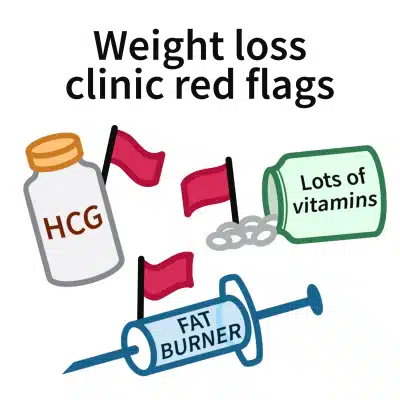For years, losing weight has been a self-help condition. If you read the right book, somehow, you’d be successful in losing weight. This approach does not work. Unfortunately, you’ll have about as much luck losing weight on your own as you would trying to lower your own blood pressure or treating your own cancer. The fact is, you are unlikely to do it alone. You need help…professional help.
The Critical Components of Medical Weight Loss
A Certified Weight Loss Physician or Nurse Practitioner (Obesity Medicine Specialist)
Why not just see your family doctor? In truth, medical residency training does a poor job of teaching weight management. You’ll end up with a diet that pushes you to eat too many sugars/carbs and no support. This approach has been tried and failed. A specialist in weight loss can design a plan that gives you complete nutrition on fewer calories with less hunger and faster weight loss. A weight loss physician can also give you the right appetite suppressant to control any hunger issues you have. Regular visits, often every week enhance weight loss through accountability.
Red flags: Avoid clinics that push HCG, “fat-burning shots’ or lots of vitamins.They do not improve weight loss and can be dangerous.
The Right Diet.
There is no one diet for everyone, so individualizing it is critical. Not too many carbs are key to weight loss, and some diets have varying amounts of protein and fat. It is important to get complete nutrition in the process. You can do this through the use of whole foods or medical-grade meal replacements. The latter are special foods that provide all of the nutrition you need on as little as 800 calories so weight loss will be faster with less hunger. With a whole food diet, you just cannot get all of the nutrients you need on fewer than 1000 to 1200 calories. Timing of eating is also a factor since eating late at night will lead to greater fat storage.
The Right Activity Plan.
Start small, build from there. Begin with 5 minutes per day and do that almost every day. Brisk walking will do. You’ll need to work up to a total of 2500 calories of exercise per week to keep off the weight, and it’s OK if it takes you 6 months to build up to this. Walking is great for some, weight training for others, swimming still for others. Find the right exercise that works in your life.
Support. Support. Support.
Everyone is different. For some, emotional eating is a problem. For some, travel or a busy grab-and-go lifestyle is the problem. Adequate sleep is required to burn fat. You’ll need a set of tools to become a weight manager, and to get through the stressful times in your life. Group classes run by a weight-loss professional have great benefits. Success in managing stressful times will help you deal better with future challenges to your plan.
A Maintenance Plan.
You will need a great amount of support after losing weight. Half of the successful dieters find keeping off weight to be even more difficult than losing it. That is not surprising, since the hormones that increase metabolism and lower appetite are reduced the more weight you lose. As a result, you won’t be able to eat as many calories as you did before weight loss. An important component of a maintenance plan (we call it “active maintenance”) is frequent weighing, 1-7 times per week helps you gauge your success. You’ll also need a plan for a weight gain of 3 pounds or more. Long term follows up with your obesity medicine specialist and adjusting the plan to meet your specific needs is just as important as the plan you used to lose weight.
 Read our FREE e-book Chasing Diets and learn about the weight loss program that works.
Read our FREE e-book Chasing Diets and learn about the weight loss program that works.

